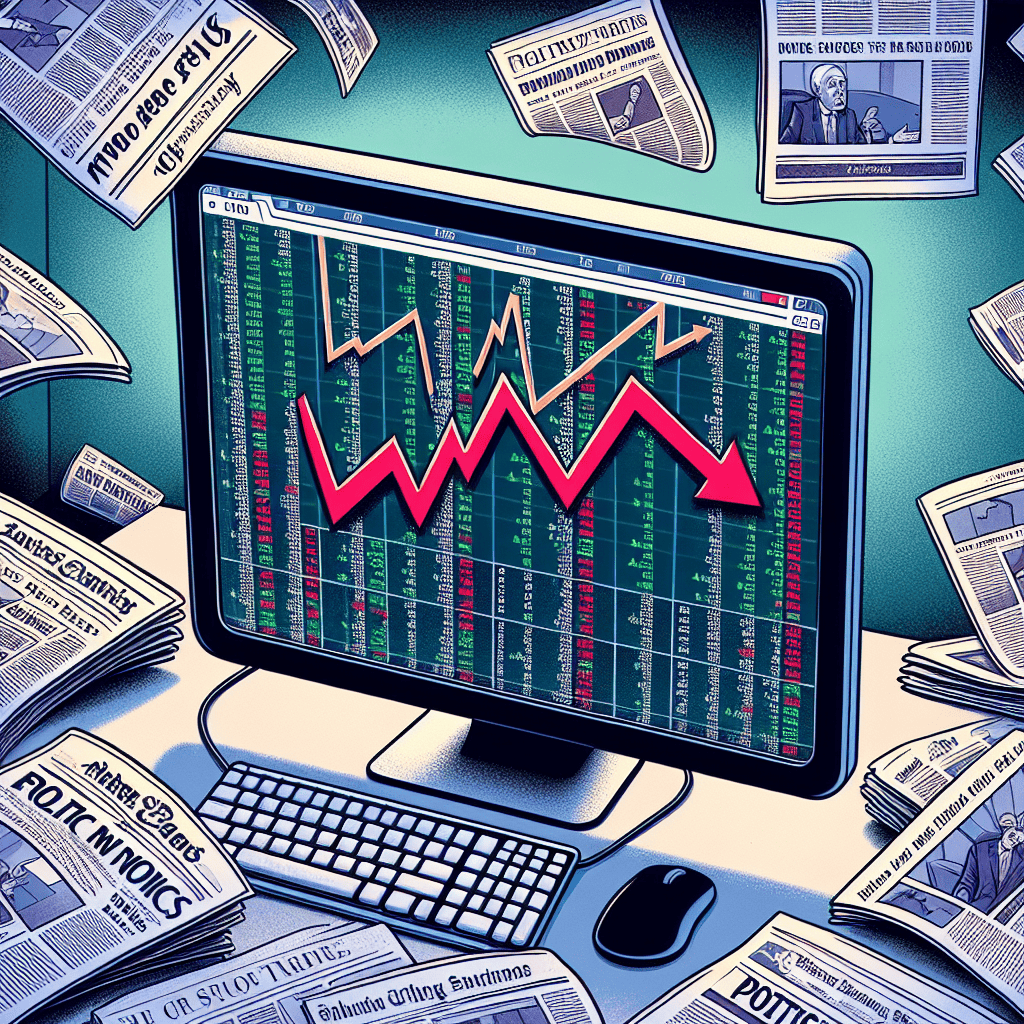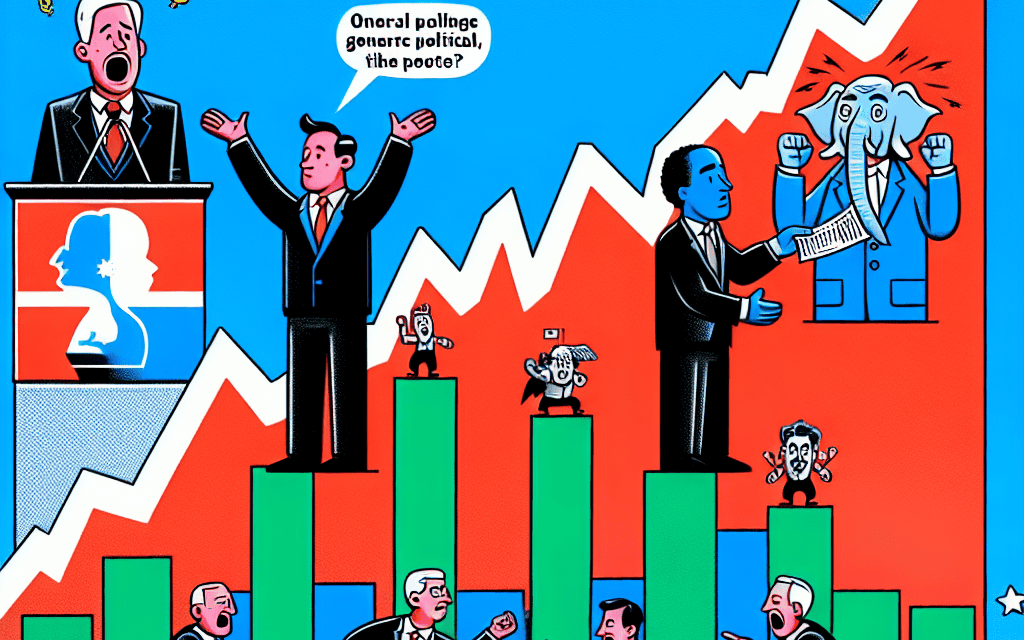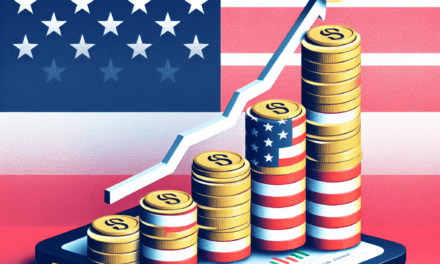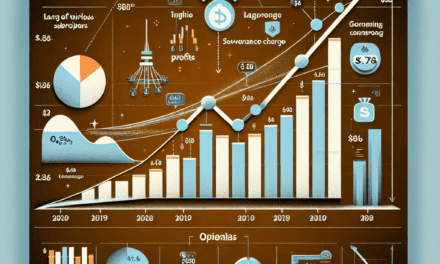“Market Moves Beyond Politics: Navigating the Noise in Presidential Times”
Introduction
The stock market’s behavior often appears detached from the political theater surrounding presidential elections, a phenomenon that has intrigued economists and investors alike. Despite the intense media focus and public interest in presidential politics, historical data suggests that the stock market tends to operate independently of the electoral process. This detachment can be attributed to several factors, including the market’s forward-looking nature, its focus on economic fundamentals, and the global influences that often outweigh domestic political changes. Investors typically prioritize corporate earnings, interest rates, and macroeconomic indicators over political rhetoric, leading to a market environment where long-term trends and global economic conditions hold more sway than the outcome of a single election. As a result, while presidential politics can create short-term volatility, the stock market’s broader trajectory is often shaped by factors beyond the immediate political landscape.
Historical Trends: Stock Market Resilience Amid Political Changes
The relationship between presidential politics and the stock market has long been a subject of intrigue and speculation. However, historical trends suggest that the stock market often exhibits a remarkable resilience to political changes, seemingly ignoring the ebb and flow of presidential politics. This phenomenon can be attributed to several factors that underscore the market’s focus on broader economic indicators rather than transient political events.
To begin with, it is essential to recognize that the stock market is primarily driven by economic fundamentals such as corporate earnings, interest rates, and global economic conditions. These factors tend to have a more direct and sustained impact on market performance than the political landscape. For instance, while presidential elections and policy shifts can create short-term volatility, investors typically prioritize long-term economic growth prospects over political rhetoric. This focus on fundamentals helps explain why the market often remains stable or even thrives amid political transitions.
Moreover, historical data reveals that the stock market has weathered various political storms with surprising resilience. For example, during the contentious 2000 U.S. presidential election, which culminated in a Supreme Court decision, the market experienced temporary fluctuations but ultimately continued its upward trajectory. Similarly, the market showed resilience during the Watergate scandal in the 1970s and the impeachment proceedings of President Clinton in the late 1990s. These instances highlight the market’s ability to compartmentalize political uncertainty and maintain its focus on economic realities.
In addition to economic fundamentals, the stock market’s resilience can also be attributed to its forward-looking nature. Investors often anticipate and price in potential political changes well before they occur, thereby mitigating the impact of actual events. This anticipatory behavior is evident in the way markets react to policy proposals during election campaigns. Investors analyze the potential implications of proposed policies on sectors and industries, adjusting their portfolios accordingly. As a result, by the time a new administration takes office, much of the political uncertainty has already been absorbed by the market.
Furthermore, the global nature of financial markets plays a crucial role in diluting the impact of domestic political changes. In today’s interconnected world, international economic developments often exert a more significant influence on market dynamics than national politics. For instance, global trade tensions, central bank policies, and geopolitical events can overshadow domestic political shifts, guiding investor sentiment and market movements. This global perspective helps explain why the stock market can remain resilient even when political changes dominate national headlines.
It is also worth noting that institutional investors, who hold significant sway over market trends, tend to adopt a pragmatic approach to political changes. These investors often have diversified portfolios and long-term investment strategies that are less susceptible to short-term political fluctuations. Their focus on risk management and strategic asset allocation further reinforces the market’s resilience to political changes.
In conclusion, while presidential politics can create short-term volatility, the stock market’s resilience amid political changes is rooted in its focus on economic fundamentals, forward-looking nature, global perspective, and the pragmatic approach of institutional investors. By prioritizing long-term growth prospects and mitigating the impact of political uncertainty, the market demonstrates an ability to navigate the complexities of political transitions with remarkable stability. As history has shown, the stock market’s resilience is a testament to its capacity to rise above the noise of presidential politics and remain anchored in the broader economic landscape.
Economic Fundamentals Over Political Rhetoric
In the realm of financial markets, the stock market often appears to operate independently of the political theater that unfolds in Washington, D.C. This phenomenon can be perplexing to those who assume that presidential politics would have a direct and immediate impact on market performance. However, a closer examination reveals that the stock market tends to prioritize economic fundamentals over political rhetoric, a tendency that underscores the complex interplay between politics and economics.
To begin with, it is essential to understand that the stock market is primarily driven by expectations of future corporate earnings and economic growth. Investors, both institutional and individual, base their decisions on a myriad of factors, including interest rates, inflation, employment data, and global economic conditions. While political events can influence these factors, they are often just one piece of a much larger puzzle. For instance, a presidential election might introduce uncertainty, but investors are more concerned with how policies will affect the economic landscape in the long term rather than the immediate political climate.
Moreover, the stock market’s focus on economic fundamentals is evident in its reaction to policy changes rather than political rhetoric. Politicians frequently make bold statements and promises during campaigns, but the market tends to wait for concrete policy actions before reacting. This is because rhetoric alone does not alter the economic environment; it is the implementation of policies that can have tangible effects. For example, tax reforms, regulatory changes, and fiscal policies are scrutinized for their potential impact on business operations and consumer spending, which in turn influence market performance.
Additionally, the global nature of today’s economy means that the stock market is influenced by a wide array of international factors. While domestic politics are important, investors must also consider global trade dynamics, geopolitical tensions, and economic developments in other countries. This broader perspective often dilutes the impact of U.S. presidential politics on the stock market, as investors weigh domestic policies against international trends and events.
Furthermore, historical data supports the notion that the stock market is resilient to political changes. Over the decades, markets have weathered numerous political shifts, including changes in administration and policy direction. While there may be short-term volatility surrounding elections or major political events, the long-term trajectory of the market is more closely aligned with economic cycles and corporate performance. This resilience is a testament to the market’s ability to adapt and thrive despite political uncertainties.
In addition to these factors, it is important to recognize the role of market psychology. Investors are aware that political landscapes are inherently volatile and subject to change. As a result, they often adopt a wait-and-see approach, focusing on long-term investment strategies rather than reacting impulsively to political developments. This mindset helps to stabilize the market, as investors prioritize data-driven decisions over emotional responses to political news.
In conclusion, while presidential politics can create headlines and stir public debate, the stock market’s primary concern remains the underlying economic fundamentals. By focusing on factors such as corporate earnings, economic growth, and global trends, the market demonstrates a remarkable ability to look beyond political rhetoric. This focus on fundamentals ensures that the stock market remains a reliable barometer of economic health, even amidst the ever-changing political landscape.
Investor Focus: Long-Term Growth Versus Short-Term Politics
In the realm of investing, the stock market often appears to operate independently of the political landscape, particularly when it comes to presidential politics. This phenomenon can be perplexing to many observers who expect significant political events to have a direct and immediate impact on market performance. However, a closer examination reveals that the stock market’s focus on long-term growth often overshadows the transient nature of political developments.
To begin with, it is essential to understand that the stock market is fundamentally driven by corporate earnings and economic indicators rather than political rhetoric. Investors are primarily concerned with the profitability and growth potential of companies, which are influenced by a myriad of factors beyond the political sphere. While presidential policies can certainly impact the economy, the effects are often gradual and subject to a multitude of variables, including global economic conditions, technological advancements, and consumer behavior. Consequently, the market tends to discount short-term political noise in favor of more substantial economic data.
Moreover, historical patterns demonstrate that the stock market has weathered various political climates with relative resilience. Regardless of which party holds the presidency, the market has shown a propensity to adapt and continue its upward trajectory over the long term. This resilience can be attributed to the market’s inherent ability to price in anticipated policy changes well in advance. Investors, equipped with sophisticated analytical tools and access to vast amounts of information, are adept at forecasting potential policy impacts and adjusting their strategies accordingly. As a result, the market often reacts more to the certainty of policy implementation rather than the uncertainty of political campaigns.
In addition, it is important to consider the global nature of today’s financial markets. The interconnectedness of economies means that investors must account for international developments that may overshadow domestic political events. For instance, geopolitical tensions, trade agreements, and foreign economic policies can exert significant influence on market dynamics. This global perspective further diminishes the relative importance of presidential politics in the eyes of investors who are focused on long-term growth opportunities across borders.
Furthermore, the diversification strategies employed by investors also play a crucial role in mitigating the impact of political fluctuations. By spreading investments across various sectors and asset classes, investors can reduce their exposure to any single political event or policy change. This approach not only enhances portfolio stability but also reinforces the market’s tendency to prioritize long-term growth over short-term political considerations.
In conclusion, while presidential politics may capture headlines and spark public debate, the stock market’s primary focus remains on long-term growth prospects. The market’s resilience in the face of political changes is a testament to its ability to adapt and thrive amidst uncertainty. By concentrating on corporate earnings, economic indicators, and global developments, investors are better equipped to navigate the complexities of the financial landscape. As such, the stock market’s apparent indifference to presidential politics underscores its commitment to long-term growth, providing a stable foundation for investors seeking to achieve their financial goals.
Global Market Influences: Beyond U.S. Presidential Politics

In the intricate world of global finance, the stock market often appears to operate independently of the political theater that unfolds in Washington, D.C. This phenomenon is particularly evident during the U.S. presidential election cycles, where one might expect significant market volatility in response to the potential for policy shifts. However, historical data and market behavior suggest that the stock market tends to remain relatively indifferent to the immediate outcomes of presidential politics. This detachment can be attributed to a variety of factors that extend beyond the realm of U.S. political dynamics, underscoring the complex interplay of global market influences.
To begin with, the stock market is fundamentally driven by economic indicators and corporate performance rather than political rhetoric. Investors are primarily concerned with factors such as interest rates, inflation, employment figures, and corporate earnings. These elements provide a more concrete basis for investment decisions than the often speculative nature of political promises. For instance, while a presidential candidate may propose sweeping economic reforms, the implementation and impact of such policies are contingent upon numerous variables, including legislative approval and economic conditions. Consequently, investors tend to focus on tangible economic data that offer a clearer picture of market trends.
Moreover, the global nature of modern financial markets means that international events and conditions often exert a more significant influence on market behavior than domestic politics. Geopolitical tensions, trade agreements, and economic developments in major economies like China and the European Union can have profound effects on investor sentiment and market performance. For example, a trade dispute between major economies can disrupt global supply chains, affecting corporate profits and stock valuations worldwide. In such scenarios, the market’s attention is diverted from domestic political events to these broader global issues, which have more immediate and measurable impacts on financial markets.
Additionally, the stock market is forward-looking, with investors constantly anticipating future events and adjusting their portfolios accordingly. This forward-thinking nature means that markets often price in expected political outcomes well before they occur. As a result, by the time an election concludes, the market has already adjusted to the anticipated policy environment, minimizing the immediate impact of the election results. This preemptive adjustment is facilitated by the vast amount of information available to investors, including polling data, expert analyses, and historical precedents, which collectively inform market expectations.
Furthermore, the diversification of investment portfolios also plays a role in mitigating the impact of presidential politics on the stock market. Investors often spread their investments across various asset classes and geographic regions to reduce risk. This diversification strategy means that even if U.S. political events were to cause market fluctuations, the overall impact on a well-diversified portfolio would be less pronounced. By balancing investments across different sectors and countries, investors can shield themselves from the volatility associated with any single political event.
In conclusion, while presidential politics undoubtedly capture public attention and can influence market sentiment in the short term, the stock market’s broader focus on economic fundamentals, global events, and forward-looking strategies often overshadows the immediate impact of political developments. This complex interplay of factors highlights the resilience and adaptability of financial markets, which continue to operate efficiently amidst the ever-changing political landscape. As such, investors are well-advised to maintain a long-term perspective, recognizing that the stock market’s trajectory is shaped by a multitude of influences beyond the confines of U.S. presidential politics.
Corporate Earnings: A Key Driver Over Political Uncertainty
In the intricate world of finance, the stock market often appears to operate independently of the political landscape, particularly during presidential election cycles. This phenomenon can be perplexing to many observers who might expect political events to have a more direct impact on market movements. However, a closer examination reveals that corporate earnings, rather than political uncertainty, serve as a more significant driver of stock market performance. Understanding this dynamic requires an exploration of the fundamental principles that govern market behavior and the factors that investors prioritize when making decisions.
To begin with, corporate earnings are a primary indicator of a company’s financial health and future prospects. Investors closely monitor earnings reports to gauge a company’s profitability and growth potential. These reports provide concrete data that can be analyzed and compared, offering a more reliable basis for investment decisions than the often unpredictable nature of political events. As a result, even during periods of heightened political uncertainty, such as presidential elections, the focus remains on the earnings performance of individual companies and sectors.
Moreover, the stock market is inherently forward-looking, meaning that investors base their decisions on expectations of future performance rather than current events. While political developments can influence market sentiment in the short term, they are typically overshadowed by longer-term economic indicators and corporate performance metrics. For instance, a company that consistently delivers strong earnings growth is likely to attract investor interest regardless of the prevailing political climate. This forward-looking nature of the market helps to explain why it often appears to disregard political events that do not have a direct and immediate impact on corporate profitability.
In addition, the global nature of many corporations further diminishes the influence of domestic political events on stock market performance. Multinational companies derive significant portions of their revenue from international markets, making them less susceptible to changes in domestic political policies. Consequently, investors are more inclined to focus on global economic trends and the performance of international markets when evaluating investment opportunities. This global perspective helps to insulate the stock market from the effects of political uncertainty within any single country, including the United States.
Furthermore, historical data supports the notion that corporate earnings are a more reliable predictor of stock market performance than political events. Over the years, numerous studies have demonstrated that there is little correlation between presidential elections and long-term market trends. While short-term volatility may occur in response to election outcomes, these fluctuations are typically short-lived and do not alter the underlying trajectory of the market. Instead, it is the strength of corporate earnings that consistently drives market growth over time.
In conclusion, while presidential politics can create a backdrop of uncertainty, it is corporate earnings that ultimately steer the stock market. Investors prioritize tangible financial data over political rhetoric, focusing on the fundamental performance of companies to guide their investment decisions. This emphasis on earnings, coupled with the forward-looking and global nature of the market, helps to explain why the stock market often appears to ignore the political theater of presidential elections. As such, understanding the primacy of corporate earnings is essential for anyone seeking to navigate the complexities of the financial markets.
Federal Reserve Policies: More Impactful Than Presidential Politics
In the intricate world of financial markets, the stock market often appears to operate independently of the political theater that unfolds in Washington, D.C. While presidential elections and political rhetoric can capture the public’s attention, seasoned investors understand that the stock market is more heavily influenced by the policies of the Federal Reserve than by the occupant of the Oval Office. This phenomenon can be attributed to the fundamental role that the Federal Reserve plays in shaping economic conditions, which in turn have a direct impact on market performance.
To begin with, the Federal Reserve, as the central bank of the United States, is tasked with managing the nation’s monetary policy. Its primary objectives include controlling inflation, maximizing employment, and stabilizing interest rates. These goals are achieved through various tools, such as setting the federal funds rate and engaging in open market operations. The decisions made by the Federal Reserve in these areas can significantly influence the cost of borrowing, consumer spending, and business investment, all of which are critical drivers of economic growth and, consequently, stock market performance.
Moreover, the Federal Reserve’s policies are designed to be apolitical, focusing solely on economic indicators rather than political agendas. This independence allows the Fed to make decisions that are in the best interest of the economy, regardless of the political climate. For instance, during times of economic downturn, the Federal Reserve may lower interest rates to encourage borrowing and spending, thereby stimulating economic activity. Conversely, in periods of rapid economic growth, the Fed might raise interest rates to prevent inflation from spiraling out of control. These actions have a more immediate and tangible impact on the economy than the promises or policies of any presidential administration.
Furthermore, historical data supports the notion that the stock market is more responsive to Federal Reserve policies than to presidential politics. For example, during the financial crisis of 2008, it was the Federal Reserve’s aggressive monetary policy interventions, such as slashing interest rates and implementing quantitative easing, that played a pivotal role in stabilizing the financial system and restoring investor confidence. Similarly, in the wake of the COVID-19 pandemic, the Fed’s swift actions to lower interest rates and provide liquidity to the markets were instrumental in averting a deeper economic crisis.
In addition to these points, it is important to recognize that the stock market is forward-looking by nature. Investors base their decisions on expectations of future economic conditions rather than current political events. While presidential elections can introduce short-term volatility due to uncertainty, the long-term trajectory of the market is more closely aligned with economic fundamentals, which are heavily influenced by Federal Reserve policies. As a result, market participants often prioritize the Fed’s outlook on inflation, employment, and growth over political developments.
In conclusion, while presidential politics can generate headlines and provoke debate, the stock market’s focus remains firmly on the economic landscape shaped by the Federal Reserve. The central bank’s ability to influence interest rates, control inflation, and stabilize the economy holds far greater sway over market dynamics than the political affiliations or policies of any president. Consequently, investors would be wise to pay closer attention to the Federal Reserve’s actions and statements, as these are the true determinants of market direction and economic health.
Market Sentiment: The Role of Investor Psychology in Political Times
In the complex world of financial markets, the interplay between politics and market sentiment often captures the attention of investors and analysts alike. However, a curious phenomenon persists: the stock market frequently appears to disregard the political theater surrounding presidential elections. This seemingly counterintuitive behavior can be attributed to the intricate dynamics of investor psychology and the broader economic factors that ultimately drive market movements.
To begin with, it is essential to understand that the stock market is primarily influenced by expectations of future corporate earnings and economic growth. While political events can create short-term volatility, the long-term trajectory of the market is more closely aligned with fundamental economic indicators. Investors, therefore, tend to focus on factors such as interest rates, inflation, and corporate profitability rather than the immediate outcomes of political contests. This focus on fundamentals helps to explain why the market often remains resilient in the face of political uncertainty.
Moreover, historical data suggests that the stock market has a remarkable ability to adapt to different political administrations. Regardless of whether a Democrat or Republican occupies the White House, the market has generally trended upward over the long term. This resilience can be attributed to the fact that businesses and investors are adept at navigating changes in policy and regulation. They adjust their strategies to align with the prevailing political environment, thereby mitigating potential negative impacts on their operations and profitability.
Another critical factor to consider is the role of investor psychology in shaping market sentiment. Investors are not solely driven by rational calculations; emotions and cognitive biases also play a significant role in decision-making processes. During election periods, heightened media coverage and political rhetoric can amplify emotions such as fear and uncertainty. However, seasoned investors often recognize these emotional responses as temporary and are more likely to maintain a long-term perspective. This ability to look beyond short-term noise helps to stabilize the market during politically charged times.
Furthermore, it is important to acknowledge the global nature of financial markets. In today’s interconnected world, domestic political events are just one of many factors influencing market sentiment. International developments, such as trade agreements, geopolitical tensions, and global economic trends, often have a more pronounced impact on investor behavior. As a result, the stock market’s reaction to presidential politics is often muted when compared to its response to significant global events.
Additionally, the diversification of investment portfolios plays a crucial role in mitigating the impact of political uncertainty. Investors often spread their investments across various asset classes and geographic regions to reduce risk. This diversification strategy helps to insulate portfolios from the potential adverse effects of political changes in any single country, including the United States. Consequently, the stock market’s overall performance is less likely to be swayed by domestic political developments alone.
In conclusion, while presidential politics undoubtedly captures public attention, the stock market’s apparent indifference can be attributed to a combination of factors. The focus on economic fundamentals, the adaptability of businesses, the influence of investor psychology, the global nature of markets, and the diversification of investment portfolios all contribute to the market’s resilience. By understanding these dynamics, investors can better navigate the complexities of political times and maintain a steady course toward their financial goals.
Q&A
1. **Question:** Why does the stock market often ignore presidential politics?
– **Answer:** The stock market tends to focus more on economic fundamentals, corporate earnings, and monetary policy rather than political events, which are often seen as short-term noise.
2. **Question:** What are the primary factors that influence the stock market?
– **Answer:** Economic indicators, interest rates, corporate earnings, and global economic conditions are primary factors influencing the stock market.
3. **Question:** How do investors typically react to political events?
– **Answer:** Investors may initially react to political events with volatility, but they often return to focusing on economic fundamentals over time.
4. **Question:** What role does monetary policy play in the stock market’s focus?
– **Answer:** Monetary policy, particularly interest rates set by central banks, plays a significant role as it directly affects borrowing costs and economic growth prospects.
5. **Question:** Can presidential policies impact specific sectors of the stock market?
– **Answer:** Yes, presidential policies can impact specific sectors, such as healthcare or energy, depending on regulatory changes or government spending priorities.
6. **Question:** How do long-term investors view political changes?
– **Answer:** Long-term investors typically view political changes as part of the broader market cycle and focus on long-term growth prospects rather than short-term political fluctuations.
7. **Question:** What historical evidence supports the market’s indifference to presidential politics?
– **Answer:** Historical evidence shows that despite changes in administration, the stock market has generally trended upwards over the long term, driven by economic growth and corporate performance.
Conclusion
The stock market often ignores presidential politics because it is primarily driven by economic fundamentals, corporate earnings, and global market trends rather than political events. While political decisions can influence market conditions, investors typically focus on long-term economic indicators and company performance. Additionally, markets tend to price in political outcomes well in advance, reducing the impact of political changes. Historical data shows that markets have performed well under both Democratic and Republican administrations, suggesting that political affiliation has a limited effect on market performance. Therefore, while presidential politics can create short-term volatility, the stock market’s focus remains on broader economic factors.





